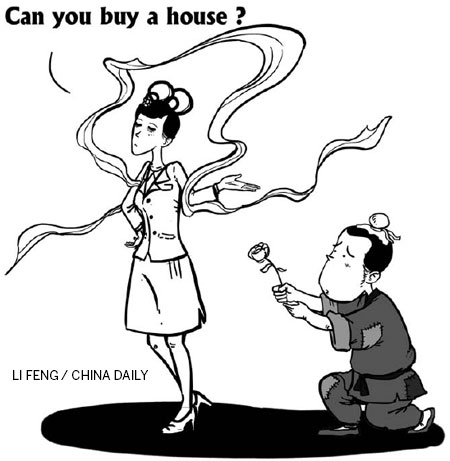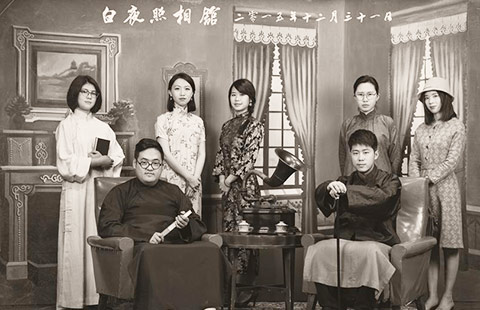The not so curious case of single women
By Xiao Lixin (China Daily) Updated: 2012-08-23 08:09Niulang, a shepherd falls in love with goddess Zhinu. They get married in the hope of living happily ever after. In walks the "villain", Zhinu's godfather. He separates the two lovers, allowing them to meet only on the seventh day of the seventh lunar month, or Qixi, which today we know as Chinese Valentine's Day. This is an ancient fairytale.
Let's return to 2012 and to the Internet. Zhinu meets Niulang on Qixi and breaks down. She says: "Can you buy a house? If you can, my parents will have no excuse to separate us."

The joke reflects the difficulties today's youth face. Buying a house, often a prerequisite for marriage, is unthinkable for many because of skyrocketing property prices. To add insult to injury, wedding ceremonies and banquets are becoming increasingly unaffordable.
At present, most couples in big cities such as Beijing and Shanghai get married with the help of their parents. Reports show that in Beijing a couple need at least 270,000 yuan ($42,470) to get married. A wedding dress and banquet would cost about 54,000, and the rest would go to pay the installment for a house and perhaps a car.
Society likes to blame young women for telling their partners to prepare for everything before marriage. But marriage has come to be based on economics, and living costs have to be calculated.
These and other factors have forced many a woman to stay single.
As early as 1996, a nationwide survey showed many women in cities had been forced to stay single. In 2005, another survey showed that 60 percent of all the single people aged between 30 to 50 years old in Beijing, were women; the figure was 82 percent in Shanghai. And surprisingly, most of them said they were enjoying their life. A 2007 survey in Shanghai revealed the number of single women to be still higher.
Chinese women are not the only ones to marry late or stay single. A survey shows that 59.1 percent of the women aged between 25 to 29 years old in South Korea are unmarried and the figure is 19 percent in the 30-34-year-old group. And in Japan, 38 percent of the women aged between 30 and 39 years are single.
The four unmarried women in our department are not too anxious to get married or find a boyfriend. Even news of our former classmates getting married or expecting a child is not a cause for anxiety. Instead, the four women tend to enjoy their single state, far away from the vagaries of mundane and serious affairs like buying a new apartment. In fact, for some women, staying single is not as bad as it seems to outsiders.
Women's choice of staying single, to some extent, is a reflection of social transition. It can even be considered an inevitable consequence of economic development on people's love and marital life.
The rise of feminism in the West, and the way Western women have changed social perceptions, have served as the spiritual motive for unmarried women in China and other East Asian countries. The spread of education, especially higher education, has also contributed to the falling number of marriages, for it has not only elevated Chinese women's social status, but also given them financial security. Highly educated women are more reluctant to get married, and the number of such women is increasing at a fast pace in China.
On one hand, well-educated single women are too preoccupied with their career to have time for dating. On the other, more self-conscious and financially independent women are becoming increasingly unwilling to live under the shadow of men. Since marriage today is not as appealing to financially independent women as it used to be, or at least is less appealing than staying single, they simply choose to live life on their own terms.
The rise in the number of single women in cities is also the result of the negative impact of the growing divorce rate. Flash marriages followed by divorce seem to have become a trend. About 465,000 couples got divorced in China in the first quarter of 2011 alone, pushing up the divorce rate to 14.6 percent. The figure was more than 33 percent in big cities such as Beijing and Shanghai.
According to the Ministry of Civil Affairs' latest figures, China's divorce rate has been rising for seven years. The insecurity of conjugal life, too, has weakened women's resolve to get married, because by staying single they can escape the mental and physical trauma of separation and financial loss.
A Chinese woman hopes to meet her Niulang. But she expects him to be "Mr Right". If not, she chooses to stay single, enjoy her life and wait for her man on the sidelines.
The author is a journalist with China Daily.
xiaolixin@chinadaily.com.cn
- China's outbound M&A hit record high at $111.9b in 2015
- LeTV unveils new icon, aims to expand in US and India
- Master gives new life to cameras in his 'hospital’
- Starbucks to open 2,500 China stores in next five years
- Rwanda mulls deal with Chinese investors to develop textile industry
- More foreign institutions allowed on China's forex market
- Major aluminum producers plan joint venture for commercial storage
- China loosens capital control for financial leasing firms at Tianjin FTZ

















